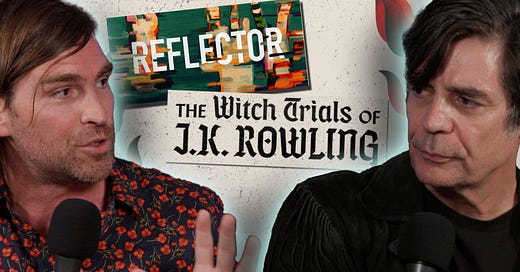Andy Mills on Quitting The New York Times, Making The Witch Trials of J.K. Rowling, and his new podcast Reflector
The podcasting maestro has helped shape a whole new form of media--but will audiences support investigative journalism without a partisan agenda?
Today’s guest on The Reason Interview is , who may be the most influential media maestro you’ve never heard of.
He was one of the creators of The New York Times’ podcast The Daily, which is by some counts the most-listened-to podcast in the country. He also created the controversial Times’ podcast Caliphate, which won plaudits and awards before it became clear that one of its main sources was not trustworthy. He also produced The Witch Trials of J.K. Rowling for , a massively popular meditation on cancel culture and public discourse featuring an incredible series of interviews with the author of the Harry Potter books after she was attacked for being a TERF. His latest offering, created with , is the investigative podcast , is a showcase for serious investigative journalism (check it out right here on Substack). The first episodes include a great look at controversial treatments for alcoholism and the free speech implications of the trial of the Atlanta-based rapper Young Thug, whose lyrics are being used by prosecutors to build a RICO (Racketeer Influenced and Corrupt Organizations Act) case.
In a wide-ranging conversation, we talk about the workplace culture at The New York Times, which Andy quit after the Caliphate controversy and related issues; how he came to be a genre-defining creator of podcasts; how his evangelical upbringing in rural Illinois continues to inform his work and worldview despite his leaving that world; and what he and Matt Boll hope to accomplish with Reflector, which is master class in how to produce compelling audio journalism. Andy is an intense and engaging talker with very strongly held beliefs who is also committed to bringing polarized people into conversation (if not agreement) with one another.
We talk too about the basic economics and evolution of podcasting. These days, it seems as if everyone has a podcast even as highly publicized shows with celebrity hosts flop all the time (Meghan Markle, anyone?) and big companies (such as Pushkin) grab headlines mostly by laying off lots of people. Over the past couple of decades—and especially over the past 10 years—podcasting has emerged as one of the defining ways we consume media, tell stories, and engage the world. But will podcasting go the way of cable news, to name a once-promising medium that is no longer particularly interesting? Will it be like daily newspapers, increasingly unread and irrelevant? Is it really just the second coming of talk radio, a way of mainlining our already existing biases?
Below is the YouTube embed for the interview, which was conducted at a live event in New York City a few weeks ago. Below that are Spotify and Apple podcast embeds. And below those are chapter headings. [Note: I’m posting this at 35,000 feet on godawful airplane wifi, so hopefully the links all work!]
If you like this content, please share it at Substack and beyond. And please subscribe to Reason—for as little at $15, you can get a year’s worth of the magazine of “Free Minds and Free Markets.”
0:00—Introduction
1:03— Reflector: Andy Mills' new podcast
3:47— Reflector Episode 1: Naltrexone for alcoholism
7:00— Reflector Episode 2: Drill rap on trial
18:16— Economics of podcasting
22:22— Has the podcast era peaked?
25:28— Starting The Daily at The New York Times
29:06— Spotify's bad Meghan Markle bet
31:04— The Witch Trials of J.K. Rowling
37:15— Caliphate controversy and The New York Times part 1
41:06— Ad: Lumen
43:09— Caliphate controversy and The New York Times part 2
45:33— What does healthy media consumption look like?
47:46— Andy Mills' rural Christian upbringing
52:50— 'Wokeness' at The New York Times
1:00:24— Q&A



